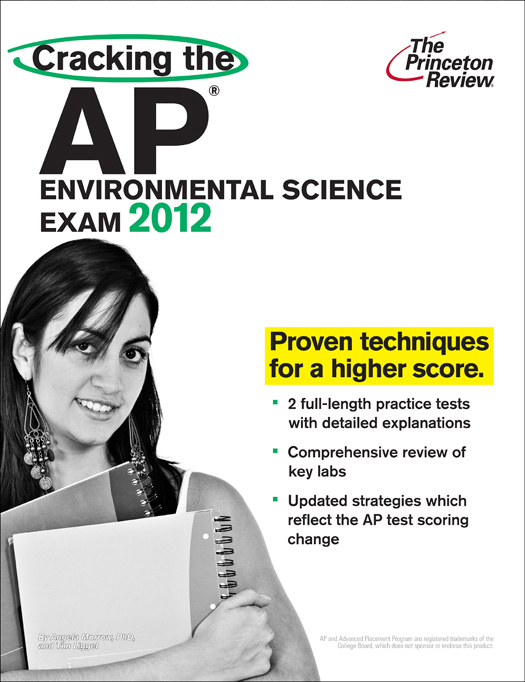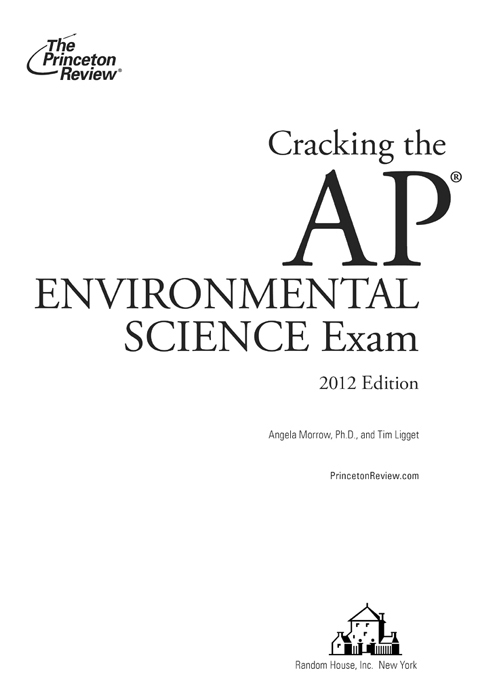
Editorial
Robert Franek, VP Test Prep Books, Publisher
Seamus Mullarkey, Associate Publisher
Laura Braswell, Senior Editor
Selena Coppock, Editor
Heather Brady, Editor
Random House Publishing Team
Tom Russell, Publisher
Nicole Benhabib, Publishing Manager
Ellen L. Reed, Production Manager
Alison Stoltzfus, Associate Managing Editor
The Princeton Review, Inc.
111 Speen St Suite 550
Framingham MA 01701
E-mail:
Copyright 2011 by The Princeton Review, Inc.
Cover art John Andreas/Alamy
The Princeton Review is not affiliated with Princeton University.
All rights reserved. Published in the United States by Random House, Inc., New York, and in Canada by Random House of Canada Limited, Toronto.
eISBN: 978-0-307-94444-3
Editors: Laura Braswell and Anya Yurchyshyn
Production Editor: Kristen Harding
v3.1
ACKNOWLEDGMENTS
This book is written in honor of my son, Stephen, who has been willing to share his birthdays and vacations with APES for the past eight years. Thank you Charles, Samantha, and Stephen for being proud of having a scientist as a mother and for all of your encouragement and understanding. George, thank you for sustaining me, and being agreeable to eating out and living with a dirty house while I was involved in this project. I appreciate you taking me to the airport in the wee hours and most importantly picking me up again. Thanks also to Rachel Warren.
Angela Morrow
I would first like to thank my wife Denise, daughters Deirdre and Sarah, and my son J. T. for their patience and understanding during the time I was working on this edition. Their encouragement made the effort so worthwhile. Secondly, I would like to thank the faculty of Gettysburg College. They nurtured my lifelong love of learning and the biological sciences. Finally, I give my thanks to all my friends at the AP readings. They helped with my professional development and renewed my love of Environmental Science every year.
Tim Ligget
A special thanks to Jacey Kahn, who reviewed the 2012 Edition of this book.
CONTENTS
Foreword
WHAT IS THE PRINCETON REVIEW?
The Princeton Review is an international test-preparation company with branches in all major U.S. cities and several cities abroad. In 1981, John Katzman started teaching an SAT prep course in his parents living room. Within five years, The Princeton Review had become the largest SAT prep program in the country.
Our phenomenal success in improving students scores on standardized tests is due to a simple, innovative, and radically effective philosophy: Study the test, not just what the test claims to test. This approach has led to the development of techniques for taking standardized tests based on the principles the test writers themselves use to write the tests.
The Princeton Review has found that its methods work not just for cracking the SAT, but for any standardized test. Weve already successfully applied our system to the GMAT, LSAT, MCAT, and GRE, to name just a few. Obviously, you need to be well versed in environmental science in order to do well on the AP Environmental Science Exam, but you should remember that any standardized test is partly a measure of your ability to think like the people who write standardized tests. This book will help you brush up on your AP Environmental Science and prepare for the exam using our time-tested principle: crack the system based on how the test is created.
We also offer books and online services that cover an enormous variety of education and career-related topics. If youre interested, check out our website at PrincetonReview.com.
1
Introduction
ALL ABOUT AP ENVIRONMENTAL SCIENCE
Congratulations on taking your college-level course on environmental science!
Though you may not have realized it, Advanced Placement (AP) Environmental Science is one of the most important and relevant courses that youve taken in your high school career. In many ways, this course will allow you to be a better citizen in the future.
The Advanced Placement Environmental Science course appeals to all types of students, regardless of their inclinations toward science. This is largely due to the fact that AP Environmental Science is interdisciplinary, so students with a wide range of interests and strengths find something appealing about its curriculum. Also, AP Environmental Science is one of the only courses that can be somewhat tailored to the geographical area in which its taught. Your instructor has the flexibility to modify the curriculum, so if you live near the ocean, your course may have a strong ocean science component, while a course taught in the middle of an urban jungle may emphasize other materialperhaps the dangers of smog, or environmental problems that result from urban sprawl.
The field of environmental science also has applications in almost every field that you can imagine. After all, everything we do takes place here on Earth, and this course is specifically about the planet we live on. The material covered in this course arguably holds as much interest to a student who hopes to become a corporate executive or lawyer as one who is interested in a career in science.
The AP Environmental Science course is one of the newer Advanced Placement courses; the first exam was administered in 1998. For this reason, its still evolving as a course. However, the philosophy behind the AP Environmental Science curriculum and exam is firmly entrenched. According to the College Board, who writes the exam, The goal of this course is to introduce you to scientific principles, concepts, and methodologies required to understand the interrelationships of the natural world, to identify and analyze environmental problems both natural and human-made, to evaluate the relative risk associated with these problems, and to examine alternative solutions for resolving and/or preventing them. So, what are these themes theyre talking about? Well, according to the College Board, they are
- Science is a process.
Science is a method of learning more about the world.
Science constantly changes the way we understand the world.
- Energy conversions underlie all ecological processes.
Energy cannot be created; it must come from somewhere.
As energy flows through systems, at each step more of it becomes unusable.
- The earth itself is one interconnected system.
Natural systems change over time and space.
Biogeochemical systems vary in ability to recover from disturbances.
- Humans alter natural systems.
Humans have had an impact on the environment for millions of years.
Technology and population growth have enabled humans to increase both the rate and scale of their impact on the environment.
- Environmental problems have a cultural and social context.
Understanding the role of cultural, social, and economic factors is vital to the development of solutions.
- Human survival depends on developing practices that will achieve sustainable systems.
A suitable combination of conservation and development is required.
Management of common resources is essential.




